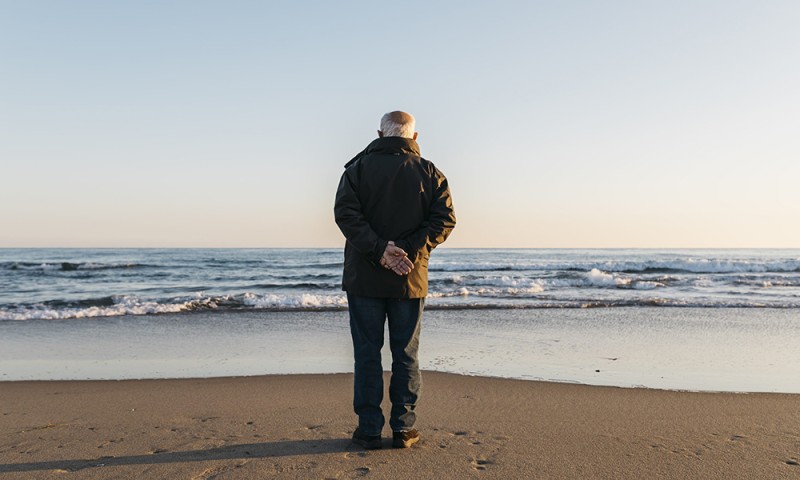
就在两年前,孤独被正式认定为一种公共健康流行病,时任美国卫生局局长维韦克·穆尔蒂援引的研究显示,孤独感与心脏病、抑郁、认知能力下降、痴呆症以及过早死亡风险增加之间存在关联。
但如今,新的研究结果可能对此提出挑战——特别是关于过早死亡风险的关联。关于两者的关联源于一系列研究,包括2015年一项荟萃分析和2018年的另一项研究。
由滑铁卢大学(University of Waterloo)公共卫生科学学院研究人员牵头、发表在《美国医学主任协会杂志》(Journal of the American Medical Directors Association)上的新国际研究发现,接受居家护理的老年人普遍存在孤独感,但与死亡风险增加并无关联。
该研究的主要作者、滑铁卢大学公共卫生科学学院教授博纳旺蒂尔·埃格布吉在一份新闻稿中表示:“我们的研究结果表明,在控制了其他健康风险因素后,在居家护理的老年人中,孤独感本身可能不会增加死亡风险。这与基于普通人群的现有大量文献相矛盾。”
在这项最新研究中,研究人员分析了来自加拿大、芬兰和新西兰的超过38万名65岁及以上居家护理对象的数据。研究作者写道:“居家护理对象是一个特别值得关注的重要群体,因为他们可能特别容易受到孤独感的负面影响。行动不便、感官障碍和复杂的健康需求可能会限制他们参与社区活动,使他们在家中相对孤立。”
然而,研究人员发现,在调整健康状况、年龄和其他风险因素后,有孤独感的人群一年内的死亡风险反而低于不感到孤独的人群。
尽管如此,研究资深作者、滑铁卢大学公共卫生科学学院教授约翰·希尔德斯表示,这并不意味着孤独感不再是一个严重的健康问题。
希尔德斯在新闻稿中表示:“孤独感对心理健康构成严重威胁。尽管孤独感本身不会致命,孤独感对心理健康造成的后果使其成为公共卫生领域的重要关注事项。”
在这项新研究中,孤独感患病率(即每100人中报告感到孤独的人数)在加拿大的居家护理对象中为15.9%,在新西兰高达24.4%。新闻稿指出:“值得注意的是,身体状况较好、且较少得到家人或朋友帮助的人更可能感到孤独,这表明健康状况、护理需求和社会联系之间存在着复杂的关联。”
作者呼吁进行更长期的跟踪研究,并建议政策制定者和医疗服务提供者将孤独感视为一个关乎生活质量的问题,而不仅仅关注其与死亡率之间的潜在关联。
希尔德斯表示:“居家和社区护理服务必须发挥保护性作用,为那些孤立人群提供社交交流的支持。”(*)
译者:刘进龙
审校:汪皓
就在两年前,孤独被正式认定为一种公共健康流行病,时任美国卫生局局长维韦克·穆尔蒂援引的研究显示,孤独感与心脏病、抑郁、认知能力下降、痴呆症以及过早死亡风险增加之间存在关联。
但如今,新的研究结果可能对此提出挑战——特别是关于过早死亡风险的关联。关于两者的关联源于一系列研究,包括2015年一项荟萃分析和2018年的另一项研究。
由滑铁卢大学(University of Waterloo)公共卫生科学学院研究人员牵头、发表在《美国医学主任协会杂志》(Journal of the American Medical Directors Association)上的新国际研究发现,接受居家护理的老年人普遍存在孤独感,但与死亡风险增加并无关联。
该研究的主要作者、滑铁卢大学公共卫生科学学院教授博纳旺蒂尔·埃格布吉在一份新闻稿中表示:“我们的研究结果表明,在控制了其他健康风险因素后,在居家护理的老年人中,孤独感本身可能不会增加死亡风险。这与基于普通人群的现有大量文献相矛盾。”
在这项最新研究中,研究人员分析了来自加拿大、芬兰和新西兰的超过38万名65岁及以上居家护理对象的数据。研究作者写道:“居家护理对象是一个特别值得关注的重要群体,因为他们可能特别容易受到孤独感的负面影响。行动不便、感官障碍和复杂的健康需求可能会限制他们参与社区活动,使他们在家中相对孤立。”
然而,研究人员发现,在调整健康状况、年龄和其他风险因素后,有孤独感的人群一年内的死亡风险反而低于不感到孤独的人群。
尽管如此,研究资深作者、滑铁卢大学公共卫生科学学院教授约翰·希尔德斯表示,这并不意味着孤独感不再是一个严重的健康问题。
希尔德斯在新闻稿中表示:“孤独感对心理健康构成严重威胁。尽管孤独感本身不会致命,孤独感对心理健康造成的后果使其成为公共卫生领域的重要关注事项。”
在这项新研究中,孤独感患病率(即每100人中报告感到孤独的人数)在加拿大的居家护理对象中为15.9%,在新西兰高达24.4%。新闻稿指出:“值得注意的是,身体状况较好、且较少得到家人或朋友帮助的人更可能感到孤独,这表明健康状况、护理需求和社会联系之间存在着复杂的关联。”
作者呼吁进行更长期的跟踪研究,并建议政策制定者和医疗服务提供者将孤独感视为一个关乎生活质量的问题,而不仅仅关注其与死亡率之间的潜在关联。
希尔德斯表示:“居家和社区护理服务必须发挥保护性作用,为那些孤立人群提供社交交流的支持。”(*)
译者:刘进龙
审校:汪皓
Loneliness was declared a public health epidemic just two years ago, with then-U.S. Surgeon General Vivek Murthy citing links to increased risk of heart disease, depression, cognitive decline, dementia, and early mortality.
But now come findings that could challenge that—specifically, the connection to early mortality, which had come out of a body of research including a 2015 meta-analysis and another from 2018.
The new international study, led by researchers at the University of Waterloo’s School of Public Health Sciences and published in the Journal of the American Medical Directors Association, has found that loneliness, while common among older adults receiving home care, is not associated with an increased risk of death.
“Our findings suggest that loneliness may not independently increase the risk of death after controlling for other health risk factors among older adults in home care,” said lead author Bonaventure Egbujie, a professor in Waterloo’s School of Public Health Sciences, in a news release. “This contradicts much of the existing literature based on the general population.”
For the latest study, researchers analyzed data from more than 380,000 home care recipients aged 65 and older in Canada, Finland, and New Zealand. “Home care recipients are a particularly important population to consider because they may be especially vulnerable to adverse effects of loneliness,” the study authors write. “Mobility problems, sensory impairments, and complex health needs may limit their engagement in the community, leaving them relatively isolated in their homes.”
But what researchers found was that lonely individuals actually had a lower risk of dying within one year compared to their non-lonely counterparts (after adjusting for health conditions, age, and other risk factors).
Still, said senior study author John Hirdes, a professor in Waterloo’s School of Public Health Sciences, that doesn’t mean it isn’t still a serious health concern.
“Loneliness is a serious threat to psychological well-being,” Hirdes said in the news release. “The mental health consequences of loneliness make it an important priority for public health, even if loneliness doesn’t kill you.”
In the new research, loneliness prevalence—meaning the number of people per 100 who reported feeling lonely—ranged from 15.9% of home care recipients in Canada to 24.4% in New Zealand. “Interestingly,” notes the news release, “people in better physical shape and who got less help from family or friends were likelier to feel lonely, suggesting a complex link between health status, caregiving needs, and social connection.”
The authors call for more longer-term studies and for policymakers and health-care providers to treat loneliness as a quality-of-life issue, not only focusing on its potential link to mortality.
“Home and community care services,” said Hirdes, “must play a protective role by supporting social contact for isolated people.”

